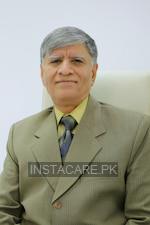Best Doctors For Refractive Surgery( PRK And LASIK) in Pakistan
Also known as Ophthalmologist, Eye doctor, Optometrist, Optic Surgeon, Oculist, Optometric Physician, Mahir-e-Amraz-e-chashm, ماہر امراض چشم
Last Updated On Friday, February 13, 2026

Dr. Nesr Farooq
PMC Verified
Dr. Noor Salam
PMC Verified
Dr. Javed Ul Hassan Chattha
PMC Verified
Brig. R Dr. Abdul Rafe
PMC Verified
Assoc. Prof. Dr. Brig R Omar Zafar
PMC VerifiedUnderstanding The Role Of An Eye Specialist
An eye specialist, also known as an ophthalmologist, is
known to be a medical doctor who specializes in the diagnosis, treatment, and
also management of disorders and diseases related to the eyes and visual
system. These professionals surely play a critical role in preserving and
enhancing vision and diagnosing and indeed treating various eye conditions to
improve patients' quality of life.
Scope Of Practice
An eye specialist's scope of practice encompasses a wide
range of conditions affecting the eyes, including refractive errors (such as
nearsightedness, farsightedness, and also astigmatism), cataracts, glaucoma,
macular degeneration, diabetic retinopathy, retinal disorders, corneal diseases,
and eye infections. Eye specialists perform comprehensive eye examinations,
prescribe corrective lenses, diagnose and treat eye diseases, and perform
surgical procedures to address vision problems and eye conditions.
Specializations Within Eye Specialist
Eye specialists at InstaCare may choose to sub-specialize in
specific areas of ophthalmology, depending on their interests, training, and
expertise. Specializations within the field of ophthalmology include cornea and
external diseases, glaucoma, retina and vitreous, pediatric ophthalmology,
neuro-ophthalmology, oculoplastics and reconstructive surgery, uveitis, and
refractive surgery (such as LASIK). Each sub-specialty focuses on different
aspects of eye health and requires additional training and certification.
Services Offered
Eye specialists at InstaCare offer a wide range of services
to patients of all ages, from routine eye examinations to complex surgical
procedures. Services may include vision testing, prescription of eyeglasses or
contact lenses, management of refractive errors, treatment of eye infections
and injuries, medical and surgical management of eye diseases (such as
cataracts, glaucoma, and retinal disorders), and cosmetic and reconstructive
procedures to improve eye appearance and function.
Preventive Care
Preventive care is essential to eye health, focusing on
early detection and intervention to prevent vision loss and preserve eye
function. Eye specialists recommend regular eye examinations to monitor vision
changes, detect eye diseases, and identify risk factors for eye conditions.
They also educate and counsel on eye safety, proper eye hygiene, and lifestyle
modifications to promote healthy vision and prevent eye injuries and diseases.
Diagnosis And Treatment
Eye specialists at InstaCare use a variety of diagnostic
tools and techniques to evaluate and diagnose eye conditions, including visual
acuity tests, refraction tests, intraocular pressure measurements, slit-lamp
examinations, dilated eye exams, and imaging studies (such as optical coherence
tomography and fundus photography). Once a diagnosis is made, eye specialists
develop personalized treatment plans tailored to each patient's needs,
including medication therapy, laser procedures, intraocular injections, or
surgical interventions to restore or preserve vision.
Advancements In Eye Specialist
Advancements in technology and medical science continue to
enhance the practice of ophthalmology and improve patient treatment outcomes.
Eye specialists have access to state-of-the-art diagnostic equipment, surgical
instruments, and treatment modalities that allow for more precise and indeed
effective diagnosis and treatment of eye conditions.
Eye specialists at InstaCare play a vital role in preserving and enhancing vision, diagnosing and treating eye conditions, and improving their patients' quality of life. Their expertise, advanced training, and dedication to ongoing education and research contribute to delivering high-quality eye care and optimal outcomes for individuals with eye-related concerns and conditions.
Q: How often should I have my eyes examined by an eye
specialist?
A: The frequency of eye examinations may vary depending on
your age, medical history, and risk factors for eye diseases. Generally, it is
recommended to have a comprehensive eye examination every 1-2 years for adults
with no known eye conditions.
Q: Can eye specialists perform surgery?
A: Eye specialists are trained and qualified to perform
various surgical procedures to address eye conditions and vision problems.
Standard surgical procedures performed by eye specialists include cataract
surgery, glaucoma surgery, retinal surgery, corneal transplantation, refractive
surgery (such as LASIK), and cosmetic eyelid surgery.
Q: What is indeed the difference between an ophthalmologist
and an optometrist?
A: Ophthalmologists are medical doctors (M.D. or D.O.) who
specialize in diagnosing, treating, and managing eye diseases and disorders.
They are trained to perform surgery and prescribe medications to treat eye
conditions.
On the other hand, optometrists specialize in primary eye care, including vision testing, prescription of corrective lenses, and diagnosis and management of refractive errors and certain eye diseases. They are not medical doctors and cannot perform surgery or prescribe medications in all states.
Frequently Asked Questions
The following are the top 5 Eye Specialist in Pakistan:
- Dr. Nesr Farooq
- Dr. Noor Salam
- Dr. Javed Ul Hassan Chattha
- Brig. R Dr. Abdul Rafe
- Assoc. Prof. Dr. Brig R Omar Zafar
Click HERE to book an appointment with a Best Eye Specialist in Pakistan . Or, you can also call at 03171777509 from 9AM to 7PM to book your appointment.
Click HERE to book an appointment with a Best Eye Specialist in Pakistan. Or, you can also call at 03171777509 from 9AM to 11PM to book your appointment.
The fee of top Eye Specialist in Pakistan ranges from 300PKR to 3000PKR. depending upon the doctor's experience and qualification.
No, there are no extra charges to book an appointment through Instacare.pk
Yes, you can book an online consultation with the best Eye Specialist in Pakistan. Find the list of Eye Specialist in Pakistan providing online consultation or call at 0310000273.
